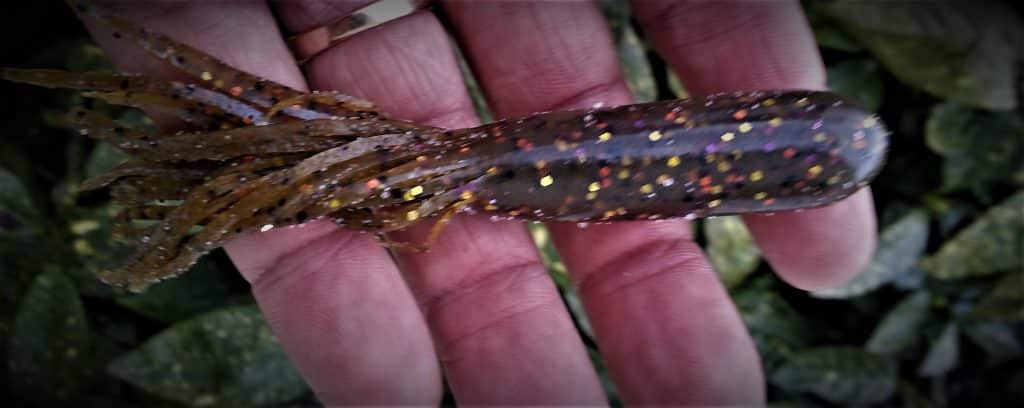A lot of lures have come and gone since the tube bait was developed in the 70’s, but it still remains popular today. It still remains one of the most versatile soft plastic baits you can use. Initially developed as a finesse bait, modern tubes have quickly taken over my tackle box. Modern tubes are getting bigger making them perfect for monster bass. While I explained how to fish with tube baits in my earlier post, I realized some people might not know how to rig up a tube bait.
How to Rig a Tube Bait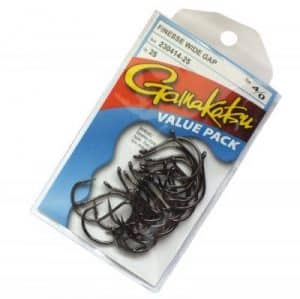
Rigging a bait so that it delivers that slow spiral is easier said than done. It requires the perfect balance of a couple different factors. First the bait must be rigged on a hook or jighead that’s the perfect size. It also must be hooked correctly. Kinks and bends on the hook won’t provide the correct action. A wide gap hook like these ones made by Gamakatsu are perfect for tubes. The perfect tube hook should have enough gap for the hooks wide body to sit cleanly on the hooks bend. It will allow the bait to ride straight on the hook providing a clean action.
There are a few pieces of advice to find the best hook or jighead. First line up the hook or jig against the tube. If the hooks bend lies about 1/4 inch away from the skirt you’ve found a match. You can even draw a line 1/4 inch from the skirt with a felt tip pen. That’s the spot that you are going to want to push the point of the hook through. A hook that’s too small will cause the lure to kink, and too large will also affect the action. In both events bass will most likely ignore your poorly rigged tube.
Proper Tube Rigging
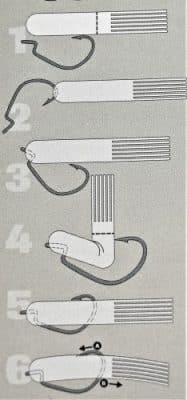 Hooking Up
Hooking Up
- Make sure the bend of the hook reaches within a quarter inch of the tube skirt. Small or large hooks will cause unnatural action.
- Push the point of the hook into the tube and out of the head of the bait.
- Rotate the Hook and pull until the eye reaches the head.
- Bend the tube until the point of the hook lines up 1/4 inch before the skirt. Beginners might even want to measure and mark the tube with a felt tip pen. Once you figure out the proper hook placement embed the hook into the proper position.
- Push the point of the hook through both the bottom and top of the tube.
- Holding the hook in one hand and tube in the other push the hook into the top portion of the tube. Pinch the tube forward slightly so that the tip of the hook will imbed in the tube slightly. After the hook is partially in the tube pull back so that it’s hooked straight.
Rigging a Jig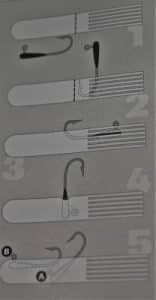
- Make sure you line up the jighead with the end of the tube. Make sure the bend of the hook lies about a 1/4 inch away from the skirt.
- Run the Hook through the back of the tube inside the skirt. Make sure you put it through where the bend in the hook was about 1/4 inch back.
- Bring the hook all the way through the tube until the jig is pointing towards the rear of the tube.
- Continue to pull the hook through the tube until it lies vertically in the hole. It’s not a problem if some of the jig head comes through the hole.
- Rotate the jighead (A) and push it through the tube until the hook is straight with the bait. Once the hook is straight pop the jighead eye up through the tube.
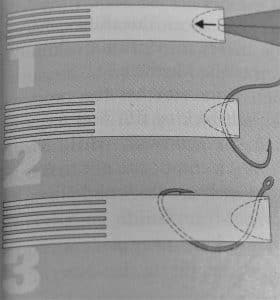
Making a Surface Tube
- Push in the front of a 3 3/4 inch tube bait using needle nose pliers. If you don’t have needle nose pliers handy you can also use a pencil to form an indentation
- Run a 4/0 Gamakatsu Hook through both sides of the indentation.
- Continue to rig the hook in the same way you would rig any other tube.
No Limits on Customization
Another very important element is going to be the presentation of bait and your tackle choice. I like to use a 6-8lb test line capable of casting either a 1/16 or 1/8 ounce weight or jighead with the tube. This setup will work for almost any freshwater fishing situation. However in certain situations you might need to use a little bit heavier tackle.
Tubes are one of the most versatile baits I’ve ever used. You can fish it weighted on a jighead, Texas rig, Carolina rig or weightless on top. Under the right circumstances tubes can catch bass in shall water, deep water or anywhere in between.
Basic Tube Fishing Technique
The basic tube fishing technique is simple enough. Just pick a spot that normally attracts bass. I like to look for weed lines or shallow sides of boulders. After you’ve picked your spot simply cast or flip out the tube. As the tube hits the water lift up your rod tip to release a few feet of extra line from the reel. Quickly close off the bail and follow the bait down with the rod tip on a slack line. This should allow the tube to spiral straight down. Once it’s down , slowly back it across the bottom.
If the above technique doesn’t work, you can also skip the tube bait across the surface with spinning tackle then let it settle. Once it settles you’re going to want to twitch the line a bit waiting for a strike. Bass might see it as one of two things. Either a fleeing injured baitfish or crawfish, either one makes a great dinner for bass. When you skip-cast a tube with a sidearm cast it looks like a minnow being chased. Any bass that sees it will go after it and if they don’t the spiraling drop can incite another strike.
Try Something Different
Traditional rigging methods are the most popular, but there are other options. Using a couple different variations will catch bass that are after a different look. If bass just aren’t biting, try fishing a tube bait on top without using a weight. This method is really effective when bass are hunting for baitfish in vegetation or attacking shad.
The teaser tube setup is another great subsurface option. This setup is especially useful for working schooling bass. You’re going to want to use two tubes rigged to mimic baitfish chasing each other near the surface. This works especially well when bass are feeding in the early morning shallows. Put a big tube in front of a smaller “teaser tube or vice versa. For the teaser you’re going to want to make a 9-12” leader with a uni-knot loop on one end and the tube on the other. The leader line should be a little bit heavier and include a 1/16 ounce weight in the teaser tube. Not using enough weight will result in irregular movement and tangling.

